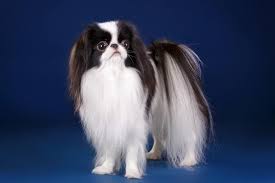
Japanese Chin
Conditions of detention
Japanese Chins thrive in indoor environments and are well-suited to apartment living. They do not require a lot of space and are content with short daily walks and indoor playtime. However, they do appreciate having a comfortable and secure space to rest.
Useful Fact: These dogs are sensitive to extreme temperatures and should be kept in a climate-controlled environment to avoid overheating or getting too cold.
Nutrition and diet
A balanced diet with high-quality dog food is essential for Japanese Chins. Their diet should include a mix of proteins, fats, and carbohydrates to support their small size and moderate activity level.
Useful Fact: Due to their small size, it is important to monitor their calorie intake to prevent obesity. Feeding them small, frequent meals can help maintain their energy levels.
Health
Japanese Chins are generally healthy dogs, but they can be prone to specific health issues such as patellar luxation, heart murmurs, and respiratory problems due to their brachycephalic (short-nosed) structure. Regular veterinary check-ups are important to monitor their health.
Useful Fact: Dental care is particularly important for this breed, as they are prone to dental issues. Regular brushing and dental chews can help maintain oral health.
Grooming and care
Japanese Chins have a silky, long coat that requires regular grooming to prevent mats and tangles. Weekly brushing helps keep their coat healthy and reduces shedding. Bathing should be done as needed to keep their coat clean and shiny.
Useful Fact: Their eyes and facial folds should be cleaned regularly to prevent infections and keep them free of debris.
Education and training
Japanese Chins are intelligent and eager to please, making them relatively easy to train. Positive reinforcement techniques work best. Early socialization and consistent training are crucial to ensure they grow into well-mannered adults.
Useful Fact: These dogs respond well to gentle training methods and can be sensitive to harsh corrections, so a patient and positive approach is essential.
Toys and entertainment
Interactive toys and activities that stimulate their mind and body are ideal for Japanese Chins. They enjoy games that challenge their intelligence, such as fetch, puzzle toys, and gentle play sessions.
Useful Fact: Providing a variety of toys can help keep them entertained and prevent boredom, which can lead to destructive behavior.
Safety
Ensuring a secure environment is important for Japanese Chins, especially when they are outdoors. Their small size makes them vulnerable to predators and accidents.
Useful Fact: Supervision during outdoor activities and providing a secure, enclosed area for play can help keep them safe.
Accessories
Japanese Chins benefit from lightweight collars, leashes, and harnesses designed for small dogs. Proper identification tags and microchips are also important.
Useful Fact: Soft, comfortable bedding is essential for their comfort, as they enjoy lounging and resting in cozy spaces.
Socialization
Early and consistent socialization helps Japanese Chins become well-adjusted dogs. Exposing them to various people, animals, and environments from a young age is beneficial.
Useful Fact: Puppy classes and regular social outings can enhance their social skills and adaptability, making them more comfortable in different settings.
Travel and Transportation
Japanese Chins travel well if accustomed to it from a young age. They should be secured in a crate or with a seatbelt harness during travel.
Useful Fact: Their small size makes them easy to transport, and they often enjoy being close to their owners during trips.
Behavior and psychology
Japanese Chins are known for their affectionate, playful, and gentle nature. They form strong bonds with their families and are generally good with children and other pets. They can be a bit reserved with strangers but are usually not aggressive.
Useful Fact: Providing regular mental and physical stimulation helps maintain their positive behavior and overall well-being. Their playful and loving nature makes them excellent companions.
Legal aspects
There are no specific legal aspects concerning Japanese Chins, but local regulations regarding pet ownership should be followed. Ensuring they are registered and microchipped is important.
Useful Fact: Being aware of local leash laws and breed-specific legislation is important for responsible ownership. Registration and identification help in case they get lost.


